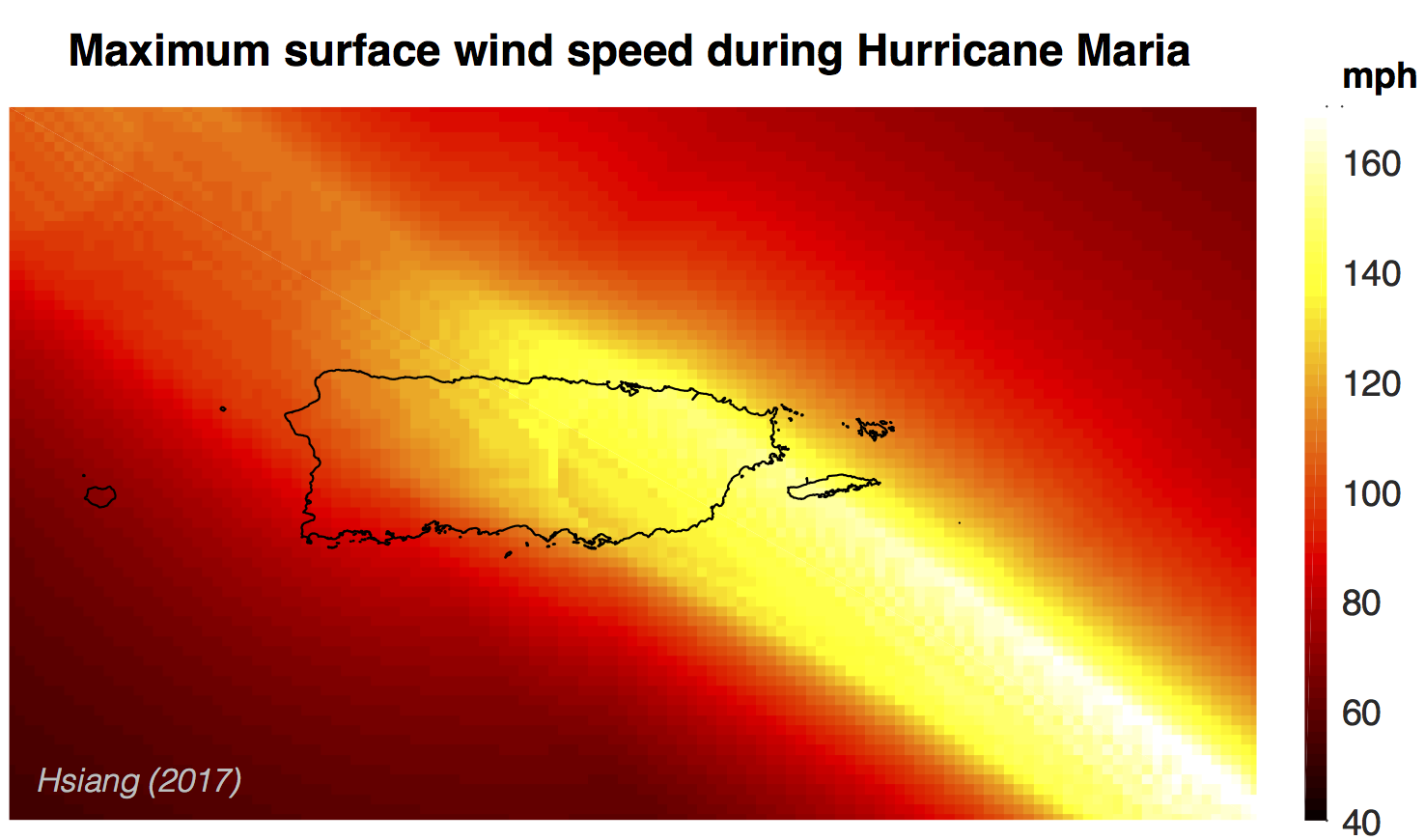Solomon Hsiang has a new joint paper with Paulina Oliva, and Reed Walker reviewing and exploring what is known about the distributional consequences of environmental damages and the benefits of environmental policy. They provide a general framework for empiricists and explore what is known in the context of pollution, deforestation, and climate. The NBER working paper is available online here. The article is forthcoming in the Review of Environmental Economics and Policy.
development
Op-Ed in the New York Times: Economic consequences of Hurricane Maria /
Solomon Hsiang and Trevor Houser published an Op-Ed in the New York Times explaining the extraordinary potential economic consequences of Hurricane Maria. By their calculation, Maria could lower Puerto Rican incomes by 21% over the next 15 years, undoing roughly 26 years of economic development. This could make Maria the most costly Atlantic storm (in percentage terms) in history.
Their calculations and more context are provided in the Climate Impact Lab Insights Blog.
Publication: Crop-damaging temperatures increase suicide rates in India /
Tamma Carleton has a new paper out in PNAS linking the climate to suicide rates in India.
The analysis is the first to provide large-scale empirical evidence that the climate influences suicide rates in a developing country. The study shows that temperature during India's main agricultural growing season has a substantial influence over annual suicide rates, such that heating up the country by just 1 degree C on one day causes approximately 65 annual suicides. This effect appears to materialize through an agricultural channel in which high temperatures cause crop losses and economic distress, leading some to commit suicide in response. Carleton estimates that warming trends experienced in India since 1980 are responsible for a total of over 59,000 suicides.
See the paper here.
Paper: Understanding farmer crop choice in response to climate change /
James Rising has a new working paper Weather-driven adaptation in perennial crop systems:An integrated study of Brazilian coffee yields, demonstrating how farmers in Brazil cope with changing environmental conditions by altering the portfolio of coffee crops they maintain. The analysis develops a novel structural Bayesian modeling approach that embeds reduced form modeling estimates, allowing James to solve (for the first time) the well-known "problem with perennials", i.e. the fact that analysts and policy-makes cannot generally observe the number of long-live plants (perennials) that farmers maintain on a farm. The analysis is important because it demonstrates how farmers cope with a changing climate by changing their investment decisions, sometimes amplifying the economic impact of changes in climate.
Paper: Non-linear network behavior of protesters during escalating social movements /
Felipe Gonzalez has a new working paper Collective Action in Networks: Evidence from the Chilean Student Movement, demonstrating how millions of students across schools in Chile influence one another to participate in a growing social movement. Felipe demonstrates how the number of individuals in each student's social network, in addition to each student's physical neighborhood, increases the likelihood that specific students will participate in the 2011 student movement. He finds strong evidence of a "tipping point" where if 40% of a student's class is participating, then the entire class "tips" and begins attending the protest. This is important because it is the first empirical evidence testing classical models of social network dynamics in revolutionary environments.
Publication: Social and economic impacts of climate /
Tamma Carleton and Solomon Hsiang published an article in Science discussing and synthesizing the methods and results used to understand the impact of climate from the last decade. We demonstrate how findings across the literature and sectors are linked, identify commonalities across numerous studies, and compute how much (i) various aspects of the current climate contribute to to historical social outcomes, (ii) how much climate change to date has affected outcomes, and (iii) quantitative projections of the future. We identify that understanding "adaptation gaps" is the most important area for future research.
Paper: Attendance distorts standardized test scores /
Felipe Gonzalez has a new working paper Distorted Quality Signals in School Markets, demonstrating that schools in Chile increase their ranking by discouraging low performing students from showing up to class on days when standardized tests are administered. This is important because standardized tests scores determine how competitive schools are ranked and how resources are allocated across schools.
Paper: Effects of legalization on black markets /
Solomon Hsiang and Nitin Sekar have a new NBER Working Paper Does legalization reduce black market activity? Evidence from a global ivory experiment and elephant poaching data.
Publication: Conflict in a changing climate /
Tamma and Sol, along with co-author Marshall Burke at Stanford, published a review of the climate and violence literature in a Special Topics issue of the European Physical Journal.
The review focuses on how to use empirical evidence from historical climate-conflict relationships to make projections about the future. We present new evidence suggesting that income mitigates the impact of temperature on crime and conflict, implying that future projections may be improved by incorporating income-based adaptation. Check out a more detailed blog post about the publication on the blog G-FEED here.





